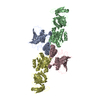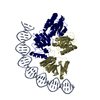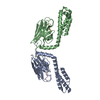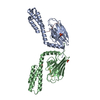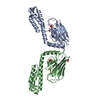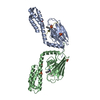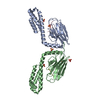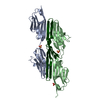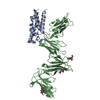+ Open data
Open data
- Basic information
Basic information
| Entry | Database: SASBDB / ID: SASDAC7 |
|---|---|
 Sample Sample | Complex LytTR-comcde
|
| Function / homology |  Function and homology information Function and homology information |
| Biological species |  |
 Citation Citation |  Journal: FEBS J / Year: 2015 Journal: FEBS J / Year: 2015Title: Modeling the ComD/ComE/comcde interaction network using small angle X-ray scattering. Authors: Dyana Sanchez / Marion Boudes / Herman van Tilbeurgh / Dominique Durand / Sophie Quevillon-Cheruel /  Abstract: The ComD-ComE two-component system controls the competence state of Streptococcus pneumoniae via the phospho-regulation of ComE, which fluctuates between monomeric and dimeric states. We previously ...The ComD-ComE two-component system controls the competence state of Streptococcus pneumoniae via the phospho-regulation of ComE, which fluctuates between monomeric and dimeric states. We previously showed that the non-phosphorylatable ComE(D) (58A) mutant is monomeric in solution, whereas the ComE(D) (58E) active mimic mutant dimerizes via its REC domains. The crystal structure of ComE(D) (58A) revealed an asymmetric dimer that may represent the activated form of ComE. Here, we investigated the binding between the catalytic domain of ComD, ComE and the promoter region comcde, using small angle X-ray scattering. ComD(catdom) is a dimer that adapts two monomers of ComE, one on each side, placing (Com) (E) D58 residue in front of (Com) (D) H248, a location that is convenient for the intermolecular transfer reaction of the phosphoryl group. The LytTR, ComE(D) (58A) and ComE(D) (58E) complexed with comcde are composed of two protein molecules per DNA duplex. Modeling the complexes against small angle X-ray scattering data indicated that ComE(D) (58E) bound to comcde forms a compact dimer similar to the crystal structure, whereas ComE(D) (58A) -comcde adopts more than one conformation with or without dimer contacts. The various oligomeric states of ComE induce different bending angles of the promoter, which provides a mechanistic scenario for the activation of ComE: the phosphorylation of ComE forces additional bending of comcde, and the release of this bending strain on DNA via the disruption of the ComE dimer may signal the shut-off of the competence state. DATABASE: The molecular models and experimental SAXS data have been deposited on SASBDB (Small Angle Scattering Biological Data Bank) (see http://www.sasbdb.org/aboutSASBDB/) under the SAS codes ...DATABASE: The molecular models and experimental SAXS data have been deposited on SASBDB (Small Angle Scattering Biological Data Bank) (see http://www.sasbdb.org/aboutSASBDB/) under the SAS codes SASDAA7, SASDAB7 and SASDAC7. |
 Contact author Contact author |
|
- Structure visualization
Structure visualization
| Structure viewer | Molecule:  Molmil Molmil Jmol/JSmol Jmol/JSmol |
|---|
- Downloads & links
Downloads & links
-Data source
| SASBDB page |  SASDAC7 SASDAC7 |
|---|
-Related structure data
| Related structure data | C: citing same article ( |
|---|---|
| Similar structure data |
- External links
External links
| Related items in Molecule of the Month |
|---|
-Models
| Model #254 |  Type: atomic / Software: SASREF / Chi-square value: 1.196836  Search similar-shape structures of this assembly by Omokage search (details) Search similar-shape structures of this assembly by Omokage search (details) |
|---|
- Sample
Sample
 Sample Sample | Name: Complex LytTR-comcde Purity method: size-exclusion high-performance liquid chromatography (SEC-HPLC) column. Specimen concentration: 0.4 mg/ml Concentration method: size-exclusion high-performance liquid chromatography (SEC-HPLC) column. Entity id: 152 / 153 |
|---|---|
| Buffer | Name: MES / Concentration: 50.00 mM / pH: 6.2 Composition: 500 mM NaCl, 5% (vol/vol) glycerol, 5 mM β-mercaptoethanol |
| Entity #152 | Type: DNA / Description: comcde / Formula weight: 23.5 / Source: Streptococcus pneumoniae Sequence: 5AAGTACACT TTGGGAGAAA AAAATGACAG TTGAGAGAA3 3TTCATGTGA AACCCTCTTT TTTTACTGTC AACTCTCTT5 |
| Entity #153 | Name: LytTR / Type: protein / Description: Response regulator / Formula weight: 14.434 / Num. of mol.: 2 / Source: Streptococcus pneumoniae / References: UniProt: Q8DMW5 Sequence: VVDYFDYNYK GNDLKIPYHD ILYIETTGVS HKLRIIGKNF AKEFYGTMTD IQEKDKHTQR FYSPHKSFLV NIGNIREIDR KNLEIVFYED HRCPISRLKI RKLKDILEKK SQKHHHHHH |
-Experimental information
| Beam | Instrument name: SOLEIL SWING  / City: Saint-Aubin / 国: France / City: Saint-Aubin / 国: France  / Type of source: X-ray synchrotron / Wavelength: 0.1 Å / Dist. spec. to detc.: 1.82 mm / Type of source: X-ray synchrotron / Wavelength: 0.1 Å / Dist. spec. to detc.: 1.82 mm | ||||||||||||||||||
|---|---|---|---|---|---|---|---|---|---|---|---|---|---|---|---|---|---|---|---|
| Detector | Name: AVIEX / Type: CCD | ||||||||||||||||||
| Scan |
| ||||||||||||||||||
| Distance distribution function P(R) |
| ||||||||||||||||||
| Result | Comments: Use of SAXS to describe the interaction between the LytTR domain of the response regulator ComE from S. pneumonia and the promoter region comcde. The complex is constituted of two monomers ...Comments: Use of SAXS to describe the interaction between the LytTR domain of the response regulator ComE from S. pneumonia and the promoter region comcde. The complex is constituted of two monomers of LytTR and one molecule of comcde. The SAXS data were collected directly after elution through an on-line size-exclusion high-performance liquid chromatography (SEC-HPLC) column. The molecular weight is not estimated from I(0) because the concentration of the complex cannot be accurately determined. It is obtained from the macromolecule volume using the method developed by Craievich’s team (the SAXS Mow program).
|
 Movie
Movie Controller
Controller


